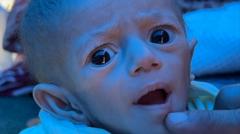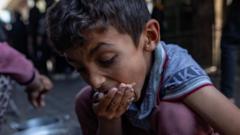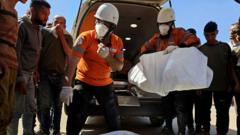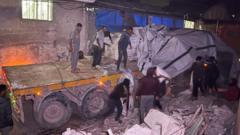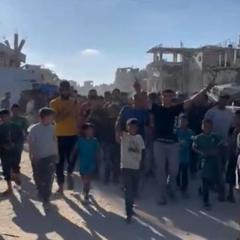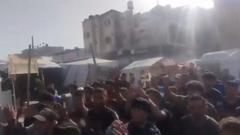In this tragic incident, Dr. Alaa al-Najjar's life has been upended following an Israeli airstrike that killed nine of her ten children and left her husband severely injured. The strike occurred in Khan Younis, igniting a national outcry as the humanitarian crisis in the region deepens.
Tragedy Strikes Gaza Doctor as Israeli Airstrike Claims Nine Children
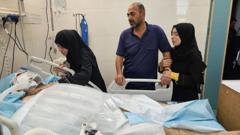
Tragedy Strikes Gaza Doctor as Israeli Airstrike Claims Nine Children
A Palestinian doctor in Gaza faces unimaginable grief after losing nine of her children in a recent Israeli airstrike, while her husband remains in critical condition.
Dr. Alaa al-Najjar is grappling with the horrific aftermath of last Friday's airstrike, which claimed the lives of nine out of her ten children. As reported by hospital staff, her husband, Hamdi al-Najjar, remains in critical condition with severe injuries sustained during the attack. The family’s ordeal is a stark reminder of the escalating violence and humanitarian plight facing Gazan civilians.
Dr. Milena Angelova-Chee, a physician at Nasser Hospital, informed the BBC of Hamdi's dire status, stating, "his life remains in danger." In addition to losing nine children aged between a few months and 12 years, the couple's surviving son, Adam, is receiving treatment for injuries but is reportedly recovering well.
The Israeli military has noted that the incident is currently under review, highlighting the complexities of warfare in a region riddled with tension. The airstrikes continued over the weekend, with the Hamas-run health ministry reporting further casualties, indicating that the ongoing conflict has resulted in the deaths of at least 3,785 Palestinians since renewed hostilities began on March 18.
Dr. Angelova-Chee expressed the profound psychological strain experienced by healthcare workers and families in Gaza. Many are shocked and devastated by the ongoing violence, and Dr. Alaa, who was at work at the hospital during the attack, is now left prioritizing her family's immediate needs amid an overwhelming humanitarian crisis.
The Israel Defense Forces (IDF) justified their airstrikes by calling Khan Younis a "dangerous war zone," advising evacuations for civilian safety. However, many residents, faced with vast destruction and no available shelters, have hesitated to leave for fear of being trapped with no place to go.
The international community is grappling with mounting concerns about the humanitarian situation in Gaza, particularly as the blockade on the territory limits essential aid. Humanitarian organizations emphasize that aid entering Gaza falls far short of the daily needs, with major shortages reported in food supplies and safety conditions worsening for those involved in aid distribution.
As the conflict rages on, the plight of families like the al-Najjars underscores the tragic human toll of a protracted war, with long-lasting repercussions for those who survive.
Dr. Milena Angelova-Chee, a physician at Nasser Hospital, informed the BBC of Hamdi's dire status, stating, "his life remains in danger." In addition to losing nine children aged between a few months and 12 years, the couple's surviving son, Adam, is receiving treatment for injuries but is reportedly recovering well.
The Israeli military has noted that the incident is currently under review, highlighting the complexities of warfare in a region riddled with tension. The airstrikes continued over the weekend, with the Hamas-run health ministry reporting further casualties, indicating that the ongoing conflict has resulted in the deaths of at least 3,785 Palestinians since renewed hostilities began on March 18.
Dr. Angelova-Chee expressed the profound psychological strain experienced by healthcare workers and families in Gaza. Many are shocked and devastated by the ongoing violence, and Dr. Alaa, who was at work at the hospital during the attack, is now left prioritizing her family's immediate needs amid an overwhelming humanitarian crisis.
The Israel Defense Forces (IDF) justified their airstrikes by calling Khan Younis a "dangerous war zone," advising evacuations for civilian safety. However, many residents, faced with vast destruction and no available shelters, have hesitated to leave for fear of being trapped with no place to go.
The international community is grappling with mounting concerns about the humanitarian situation in Gaza, particularly as the blockade on the territory limits essential aid. Humanitarian organizations emphasize that aid entering Gaza falls far short of the daily needs, with major shortages reported in food supplies and safety conditions worsening for those involved in aid distribution.
As the conflict rages on, the plight of families like the al-Najjars underscores the tragic human toll of a protracted war, with long-lasting repercussions for those who survive.

